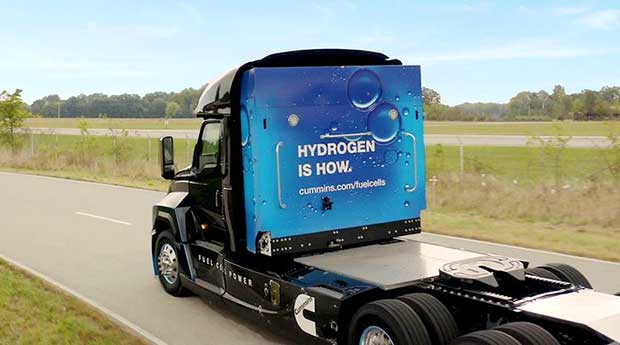
A $7 million grant has been provided to Cummins by the U.S. Department of Energy’s Office of Energy Efficiency and Renewable Energy. The award will provide the manufacturer with the ability to keep on working on hydrogen fuel cell technology for the large vehicle sector.
Cummins has said that the award is for their continued work on both enhancing the viability of fuel cell powertrain solutions as well as their work on more heavy-duty appliances such as buses and agricultural equipment. Cummins has been involved in a wide-reaching different partnership programs, with each part of the wider H2@Scale program run by the DOE.
The aim is simple: to make the opportunity for mass hydrogen production and storage a reality in the future. Cummins has worked on over 2,000 fuel cells and over 600 electrolyzer systems which are already being used. The company also says that it is making sustained efforts to widen their capabilities, bringing in more hydrogen and fuel cell power options into the wider market.
The President of new power at Cummins, Amy Davis, said: “Programs like ‘H2@Scale’ are essential to gain the scale and investment needed that will lead to faster adoption of hydrogen fuel cell technologies. The work we are doing with the DOE and our partners will help improve cost and operational performance of hydrogen fuel cell technologies to achieve greater parity with other available power solutions. We are looking forward to moving this technology forward and bringing additional hydrogen products to our customers.”
The next step forward
This award will go towards helping the company develop and further their work on hydrogen fuel cell technology. The first award will be for around $3.5m and should provide an integrated fuel cell electric powertrain development. This will be used for trucks, buses, and other heavy-duty equipment that might be used in the agricultural sector.
This will include development of an easy to use and easy to scale system that can provide a proven range of around 300 miles or more. It will also be expected to be able to provide improved fuel economy for the trucks and buses that it will be used within.
The second award, for around $3m, will see the company work on the development of a high pressure and modular 100kW proton exchange membrane fuel cell stack. This would be used for powering high-end applications and would help to reduce power usage and improve efficiency across an operational time of 25,000 hours minimum.
As the numbers show, this is an ambitious and far-reaching project that is sure to need a lot of effort and input from all involved. In the rush to make hydrogen fuel cell technology a viable reality, though, it’s money well-spent.
Citations